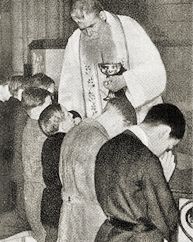 |
Just A Minute (Listen) Some of EWTN's most popular hosts and guests in a collection of one minute inspirational messages. A different message each time you click. |
Posted on 02/27/2015 9:11:07 PM PST by Salvation
-St. Augustine of Hippo
 |
Just A Minute (Listen) Some of EWTN's most popular hosts and guests in a collection of one minute inspirational messages. A different message each time you click. |
|
|
|
The Angel of the Lord declared to Mary:
Behold the handmaid of the Lord: Be it done unto me according to Thy word.
And the Word was made Flesh: And dwelt among us.
Amen. |
Feast Day: February 28 or November 17
Born: at Sardinia
Died: 28 February 468 at Rome, Italy
St. Romanus and St. Lupicinus
Feast Day: February 28
Born: 390/(around)400 : : Died: 460/480
These French saints were brothers. Everyone who knew St. Romanus as a youth admired him for his goodness. He had a great wish to become a saint. Since he saw that it was very easy to forget about God in this world, at the age of thirty five, Romanus decided to go away to a quiet place and live as a hermit.
First, he asked the advice of a holy monk, and then he started off. He took a book with him called The Lives of the Fathers of the Desert by Cassian. He also took seeds to plant and a few tools.
With these supplies, he went into the forests of the Jura mountains between Switzerland and France and settled down beneath a huge fire tree at a place called Condat. There he found a spot of land good for growing his garden and food, and some trees from which he could eat a kind of wild fruit. He spent his time praying and reading his book. He also planted and cared for his garden, quietly enjoying nature.
Soon afterward, his brother Lupicinus joined him. Romanus and Lupicinus were very different. Romanus was hard on himself but he was kind and gentle and full of understanding with others. Lupicinus was tough and very strict with himself and usually the same with others but he only meant good and did not do it to hurt anyone. The two brothers understood each other and got along peacefully.
Many men came to join them. They wanted to be monks, too, so they built two monasteries. Romanus was the abbot of Condat (now Saint Claude) and Lupicinus was the abbot of Leuconne. Later they built the convent of La Beaume for nuns (now St. Romain de la Roche).
The monks lived simple, hard lives. They ate simple food which was mainly bread made of barley or bran and pulses and slept on the ground or on hard boards. St. Lupicinus wore a tunic made of skins of animals with a cowl: and wore wooden shoes.
They prayed much and made sacrifices cheerfully. They did penance to strengthen themselves against the temptations of the devil. They worked very hard farming to grow their food and kept silent all the time.
They lived like this because they wanted to grow close to God and when they were silent they were able to pray and talk with God. Their lifestyle helped them become more holy.
St. Romanus died in 460 and was buried at the abbey of Beaume. His younger brother, St. Lupicinus, died in 480.
| Matthew | |||
| English: Douay-Rheims | Latin: Vulgata Clementina | Greek NT: Byzantine/Majority Text (2000) | |
| Matthew 5 |
|||
| 43. | You have heard that it hath been said, Thou shalt love thy neighbor, and hate thy enemy. | Audistis quia dictum est : Diliges proximum tuum, et odio habebis inimicum tuum. | ηκουσατε οτι ερρεθη αγαπησεις τον πλησιον σου και μισησεις τον εχθρον σου |
| 44. | But I say to you, Love your enemies: do good to them that hate you: and pray for them that persecute and calumniate you: | Ego autem dico vobis : Diligite inimicos vestros, benefacite his qui oderunt vos, et orate pro persequentibus et calumniantibus vos : | εγω δε λεγω υμιν αγαπατε τους εχθρους υμων ευλογειτε τους καταρωμενους υμας καλως ποιειτε τοις μισουσιν υμας και προσευχεσθε υπερ των επηρεαζοντων υμας και διωκοντων υμας |
| 45. | That you may be the children of your Father who is in heaven, who maketh his sun to rise upon the good, and bad, and raineth upon the just and the unjust. | ut sitis filii Patris vestri, qui in cælis est : qui solem suum oriri facit super bonos et malos : et pluit super justos et injustos. | οπως γενησθε υιοι του πατρος υμων του εν [τοις] ουρανοις οτι τον ηλιον αυτου ανατελλει επι πονηρους και αγαθους και βρεχει επι δικαιους και αδικους |
| 46. | For if you love them that love you, what reward shall you have? do not even the publicans this? | Si enim diligitis eos qui vos diligunt, quam mercedem habebitis ? nonne et publicani hoc faciunt ? | εαν γαρ αγαπησητε τους αγαπωντας υμας τινα μισθον εχετε ουχι και οι τελωναι το αυτο ποιουσιν |
| 47. | And if you salute your brethren only, what do you more? do not also the heathens this? | Et si salutaveritis fratres vestros tantum, quid amplius facitis ? nonne et ethnici hoc faciunt ? | και εαν ασπασησθε τους φιλους υμων μονον τι περισσον ποιειτε ουχι και οι τελωναι ουτως ποιουσιν |
| 48. | Be you therefore perfect, as also your heavenly Father is perfect. | Estote ergo vos perfecti, sicut et Pater vester cælestis perfectus est. | εσεσθε ουν υμεις τελειοι ωσπερ ο πατηρ υμων ο εν τοις ουρανοις τελειος εστιν |
Saturday, February 28
Liturgical Color: Violet
The observance of Lent can be traced to
early Christian times. In 331 A.D., St.
Athanasius urged his followers to
observe 40 days of fasting as a form of
penance in preparation for Holy Week.
This practice quickly spread through the
whole Church.
|
|
|
Lent Day 11 – The Adventure of Faith
by Fr. Robert Barron
Whenever the Bible speaks of Abraham, it is speaking of faith, for he is our father in faith. The story of the Akeda, the great test of faith and obedience, comes near the end of a lifetime of faith. As we enter more deeply into Lent, it would behoove us to take a quick look at where Abraham’s story began.
Abram, at the age of 75, was summoned by God to leave his home city and, with everything he owned, to begin a wandering trek in the desert in search of a land that God would show him. The miracle is that he did it since, at first he seems to be wavering in faith. He needs some kind of guarantee.
God makes a formal covenant with him, and he does so in the standard manner of the time. He tells Abram to bring several animals forward and to cut them in two, laying their halves side-by-side. The idea is that the two people entering into an agreement would walk in between the severed pieces and swear that the same would happen to them if they broke the covenant.
Abram falls into a trance and a deep terrifying darkness came over him. Here we see his side of the deal. What does trance imply if not a loss of control? When you fall asleep or unconscious, you are practically defenseless. And doesn’t darkness signal the same thing? The fear of the dark is primordial. We don’t know where we are going, and that is so frustrating! So it is with the things of God.
But then we see God’s side of the deal. “When the sun had set and it was dark, there appeared a smoking firepot and a flaming torch which passed between those pieces.” In the form of fire, God signals his covenant fidelity. God can be trusted, even when he is leading us through the deepest darkness. This means that great faith is justified—for Abram, and for us.

Daily Readings for:February 28, 2015
(Readings on USCCB website)
Collect: Turn our hearts to you, eternal Father, and grant that, seeking always the one thing necessary and carrying out works of charity, we may be dedicated to your worship. Through our Lord Jesus Christ, your Son, who lives and reigns with you in the unity of the Holy Spirit, one God, for ever and ever.
RECIPES
ACTIVITIES
o Rabbits, Ember Days and First Fruits
o The Liturgical Life of Christians at Rome in Post-Apostolic Times
PRAYERS
o Prayer for the First Week of Lent
o Brief Meditations on the Church Year: Spring or Lent Ember Days
LIBRARY
o A Revival of Christian Culture Through the Family | Jennifer Gregory Miller
o Catholics Give the Best Parties | Jeffrey Tucker
· Lent: February 28th
· Saturday of the First Week of Lent
Old Calendar: St. Hilary, pope (Hist); St. Romanus, abbot (Hist)
Historically today is the feast of St. Hilary, pope from 461 to 468 and guardian of Church unity and St. Romanus of Condat who founded the abbeys of Condat and Leuconne, and the convent of La Beaume, among others.
Bl. Daniel Brottier was beatified by St. John Paul II on November 25, 1984. He was a French Roman Catholic priest in the Congregation of the Holy Spirit (who currently refer to themselves as Spiritans). He was awarded the Croix de guerre and the Légion d'honneur for his services as a chaplain during World War I, did missionary work in Senegal, and administered an orphanage in Auteuil, a suburb of Paris.
Today is the first of the traditionally observed Ember Saturday of the Spring Ember Days. There are two principal objects for the Ember Days of this period of the year: the first is to publicly offer thanks to God the season of Spring, and secondly to ask God to bless the fruits of the earth and human labor. A third traditional focus of the Ember Days is to ask Him to enrich with His choicest graces the priests and sacred ministers particularly those who might be ordained on this day.
St. Hilary To replace a man like Leo was not easy, but the next pope was a man after Leo's heart, the archdeacon Hilary. Hilary was a Sardinian who had joined the Roman clergy and had been sent by St. Leo as one of the papal legates to the council at Ephesus in 449. This council, intended to settle the Monophysite affair, got out of hand. Packed with Monophysites and presided over by Dioscorus, the patriarch of Alexandria, the assembly refused to listen to the protests of the papal legates. Dioscorus steam-rollered through the council a condemnation of the orthodox and saintly Flavian, patriarch of Constantinople, and an approval of the Monophysite leader Eutyches. In vain Hilary protested. He had to fly in fear for his life and hide in a chapel of St. John the Evangelist. It was only with difficulty that he got back to Rome. No wonder St. Leo called this Ephesus council a gathering of robbers!
To replace a man like Leo was not easy, but the next pope was a man after Leo's heart, the archdeacon Hilary. Hilary was a Sardinian who had joined the Roman clergy and had been sent by St. Leo as one of the papal legates to the council at Ephesus in 449. This council, intended to settle the Monophysite affair, got out of hand. Packed with Monophysites and presided over by Dioscorus, the patriarch of Alexandria, the assembly refused to listen to the protests of the papal legates. Dioscorus steam-rollered through the council a condemnation of the orthodox and saintly Flavian, patriarch of Constantinople, and an approval of the Monophysite leader Eutyches. In vain Hilary protested. He had to fly in fear for his life and hide in a chapel of St. John the Evangelist. It was only with difficulty that he got back to Rome. No wonder St. Leo called this Ephesus council a gathering of robbers!
As pope, Hilary worked hard to foster order in the Gallic hierarchy. When a certain Hermes illegally made himself archbishop of Narbonne, two Gallic delegates came to Rome to appeal to Pope Hilary. He held a council at Rome in 462 to settle the matter. He also upheld the rights of the see of Arles to be the primatial see of Gaul. From Spain also came appeals of a similar nature. To settle these Hilary held a council at Rome in 465. This is the first Council at Rome whose acts have come down to us. According to the "Liber Pontificalis" he sent a letter to the East confirming the ecumenical councils of Nicaea, Ephesus, and Chalcedon, and the famous dogmatic letter of his predecessor St. Leo to Flavian. He also publicly in St. Peter's rebuked the shadow-emperor Anthemius for allowing a favorite of his to foster heresy in Rome.
St. Hilary deserves great credit for his work in building and decorating churches in Rome. Of especial interest is the oratory he built near the Lateran, dedicated to St. John the Evangelist. The Pope attributed his escape from the wild Monophysites at Ephesus to the intercession of the Beloved Disciple, and to show his gratitude he built this beautiful oratory. Over its doors may still be seen the inscription, "To his deliverer, Blessed John the Evangelist, Bishop Hilary, the Servant of Christ." Hilary built two more churches and spent freely in decorating still others. The gold and silver and marble used so lavishly by this Pope in adorning the Roman churches indicate that the wealthy families of Rome must have saved something from the grasping hands of Goths and Vandals.
St. Hilary died on February 29. His feast is kept on February 28.
Excerpted from Defending the Faith
Saint Romanus of Condat Saint Romanus of Condat (c. 390 - c. 463) is a saint of the fifth century. At the age of thirty five he decided to live as a hermit in the area of Condat. His younger brother Lupicinus followed him there. They became leaders of a community of monks that included Saint Eugendus.
Saint Romanus of Condat (c. 390 - c. 463) is a saint of the fifth century. At the age of thirty five he decided to live as a hermit in the area of Condat. His younger brother Lupicinus followed him there. They became leaders of a community of monks that included Saint Eugendus.
Romanus and Lupicinus founded several monasteries. These included Condat Abbey, which was the nucleus of the later town of Saint-Claude, Jura), Lauconne (later Saint-Lupicin, as Lupicinus was buried there), La Balme (Beaume) (later Saint-Romain-de-Roche), where Romanus was buried, and Romainmôtier (Romanum monasterium) in the canton of Vaud in Switzerland.
Romanus was ordained a priest by St. Hilary of Arles in 444.
Excerpted from Wikipedia
Bl. Daniel Brottier Blessed Daniel Brottier was a French Spiritan born in France in 1876 and ordained priest 1899. His zeal for spreading the Gospel beyond the classroom or the confines of France made him to join the Spiritan Congregation.
Blessed Daniel Brottier was a French Spiritan born in France in 1876 and ordained priest 1899. His zeal for spreading the Gospel beyond the classroom or the confines of France made him to join the Spiritan Congregation.
He was sent to Senegal, West Africa. After eight years there, his health suffered and he went back to France where he helped raise funds for the construction of a new cathedral in Senegal.
At the outbreak of World War I Daniel became a volunteer chaplain. He attributed his survival on the front lines to the intercession of Saint Therese of Lisieux, and built a chapel for her at Auteuil when she was canonized.
After the war he established a project for orphans and abandoned children "the Orphan Apprentices of Auteuil" in the suburb of Paris.
He gave up his soul to God on the 28th of February, 1936 and was beatified only 48 years later in 1984 by Pope John Paul II.
Excerpted from Evangelizo.org
Things to Do:
 The Station is in the basilica of St. Peter in the Vatican, where the people would assemble towards evening, that they might be present at the ordination of the priests and sacred ministers. This day was called Twelve-Lesson-Saturday, because, formerly, twelve passages from the holy Scriptures were read, as upon Holy Saturday. Built by Constantine in 323, the basilica was erected over the place where St. Peter was buried.
The Station is in the basilica of St. Peter in the Vatican, where the people would assemble towards evening, that they might be present at the ordination of the priests and sacred ministers. This day was called Twelve-Lesson-Saturday, because, formerly, twelve passages from the holy Scriptures were read, as upon Holy Saturday. Built by Constantine in 323, the basilica was erected over the place where St. Peter was buried.
1st Week of Lent
Be perfect, just as your heavenly Father is perfect. (Matthew 5:48)
Maybe this isn’t the verse that we would have chosen to reflect on today. According to the dictionary, perfect means “entirely without flaw or defect … meeting supreme standards of excellence … satisfying all requirements.” To which many of us would respond: Really, Lord? I’m struggling just to keep one little Lenten resolution! I’ll never be perfect, no matter how hard I try.
One reason that perfection can seem so unattainable is that it sounds like an either-or proposition: you’re either perfect or imperfect. But as Scripture scholars point out, the Greek word translated as “perfect” in Matthew 5:48 carries a more dynamic meaning. It indicates something you grow into—a process of becoming whole and complete. From this perspective, we can imagine Jesus saying, “Keep moving forward! Keep working on becoming the person I created you to be. Don’t settle for anything less than the holiness of wholeness!” It may seem ironic, but it’s true: the more you become the unique person God made you to be, the more you will resemble Jesus, the perfect One.
So how do you grow into this perfection? Self-improvement programs won’t produce the change, and neither will piling on Lenten disciplines and spiritual calisthenics. It comes as you try your best to use your talents and gifts in a way that glorifies the Lord and lifts up the people around you. It comes as you focus on one or two roadblocks in your life: an unresolved resentment, an unhealthy habit, or a skewed way of thinking about life. Look for the things that keep you from becoming the person you know you can become.
Today, ask the Lord how he wants you to grow and change. Let him shine the light of his love on your heart. Let him show you both the person you’re meant to be and the person you are right now. Then come up with one or two things you can do to help bridge the gap between these two visions.
Blessed John Henry Newman once said, “To live is to change, and to be perfect is to have changed often.” As you seek to hear and follow Jesus, may you change—and often—throughout this Lenten season!
“Lord Jesus, although it seems incredible, I believe that you are leading me to wholeness and holiness!”
Deuteronomy 26:16-19
Psalm 119:1-2, 4-5, 7-8
Daily Marriage Tip for February 28, 2015:
How are you doing with your Lenten resolutions? Keeping them can be easier if you and your spouse hold each other accountable.
Language: English | Español
All Issues > Volume 31, Issue 2
|
||||||||||||||||||||||||||||||||||||||||

Disclaimer: Opinions posted on Free Republic are those of the individual posters and do not necessarily represent the opinion of Free Republic or its management. All materials posted herein are protected by copyright law and the exemption for fair use of copyrighted works.